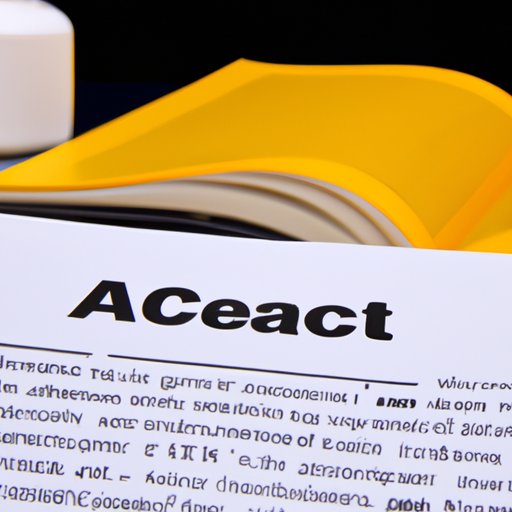Examining the Science Content on the ACT Test
The ACT is a standardized college admissions test that measures students’ knowledge and skills in five subject areas: English, Math, Reading, Science, and Writing. While many students focus primarily on the English and Math sections of the exam, it is important to not overlook the Science section. In order to do well on the ACT, it is essential to understand the types of science content covered on the exam and how to prepare for it.

Overview of the Scientific Concepts Covered on the ACT
The Science section of the ACT consists of 40 multiple-choice questions given over 35 minutes. According to the ACT, “all questions are based on reading passages that describe scientific ideas, principles, and experiments.” The passages cover topics from the fields of biology, chemistry, physics, earth and space sciences, and general science. Some sample questions include those related to interpreting data presented in tables or graphs, drawing logical conclusions from given information, and understanding the implications of scientific studies.
Different Types of Science Found on the ACT
The Science section of the ACT covers a variety of scientific topics. These include concepts from the fields of biology, such as genetics, ecology, and cellular structure; chemistry, such as atomic structure, chemical reactions, and thermodynamics; physics, such as energy, motion, and force; and earth and space sciences, such as geology, meteorology, and astronomy. Additionally, there are some questions that address general scientific principles, such as the scientific method and the nature of scientific inquiry.

Tips for Mastering the Science Section of the ACT
To do well on the Science section of the ACT, it is important to be familiar with the types of scientific content covered on the exam. Students should take advantage of the many resources available to help them prepare. For example, they can use practice tests and online tutorials to learn the material and become comfortable with the types of questions asked on the exam.
Additionally, it is important to develop good test-taking strategies. This includes reading the questions carefully, understanding what is being asked, and eliminating any answer choices that are obviously incorrect. Additionally, it is important to budget time wisely so that all questions can be answered before the end of the exam.
Benefits of Being Prepared for the Science Questions on the ACT
Being prepared for the Science section of the ACT can have many benefits. According to Dr. Jennifer K. Kohn, an education professor at the University of South Florida, “students who are knowledgeable and well-prepared in science will be better equipped to make informed decisions throughout their lives.” Additionally, having a strong understanding of science can help students to do well on other sections of the exam, such as the Math and Reading sections, which may contain science-related questions.

Common Misconceptions about the Science Content on the ACT
Despite the importance of the Science section of the ACT, there are still many misconceptions about its content. One common misconception is that the science content is too difficult. However, the science content on the ACT is designed to assess students’ understanding of basic scientific principles and concepts, not advanced scientific knowledge.
Another misconception is that the questions are too abstract. In reality, the questions are designed to assess students’ understanding of scientific concepts and principles, and require them to think logically about the material presented. Finally, some students mistakenly believe that memorization of facts and figures is all that is needed to do well on the Science section. However, the Science section requires students to interpret and analyze data in order to draw logical conclusions.
Conclusion
The Science section of the ACT is an important part of the exam, and it is essential that students understand the types of scientific content that are covered. By taking advantage of available resources and developing good test-taking strategies, students can ensure that they are well-prepared for the Science section of the exam. Additionally, it is important to dispel the common misconceptions about the science content on the ACT in order to ensure that students have an accurate understanding of the material.
In conclusion, the Science section of the ACT can be challenging, but with proper preparation and understanding of the types of questions asked, students can improve their performance on this important part of the exam.
(Note: Is this article not meeting your expectations? Do you have knowledge or insights to share? Unlock new opportunities and expand your reach by joining our authors team. Click Registration to join us and share your expertise with our readers.)
